Dominica grieving: Life after Hurricane Maria
- Published
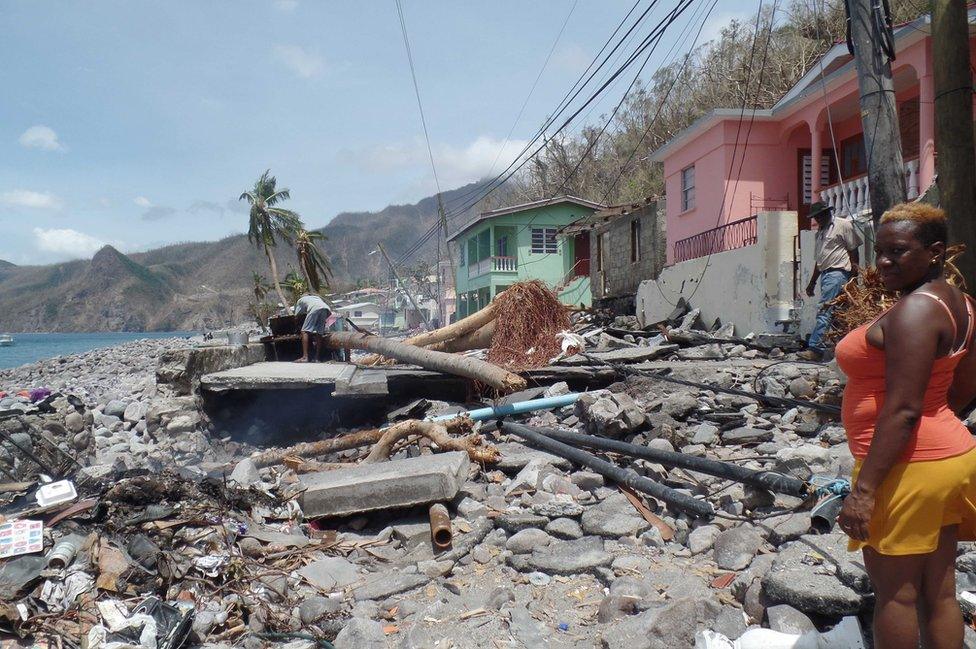
Locals in Scott's Head are yet to receive emergency medicines or supplies
Day breaks with the anguished cries of an elderly invalid woman as a relative tends to her excruciating bedsores.
Here, in the tiny fishing village of Scott's Head in Dominica - which was slammed by the full force of catastrophic Hurricane Maria last week - basic medication is as woefully absent as food and water.
Up to Sunday, its 800 residents were yet to receive any official aid, almost a week after being flattened by the country's first category five storm in recorded history.
According to Prime Minister Roosevelt Skerrit, not a single street island-wide was spared the fury of Maria's 280km/h (175mph) winds, which islanders described as the sound of a "demented animal".
Indiscriminate in its destruction, the storm tore apart homes, ravaged businesses, and wiped out infrastructure and agriculture; the 'nature isle' demolished by nature itself.
Latest reports state 27 lives have been claimed so far, with dozens more still missing.
With most boats pulverised and a line of rubble where the road used to be, Scott's Head is one of several communities left entirely cut off. A sense of disbelief pervades at the lack of emergency supplies or a single government visitor so many days later.
"I cry, I laugh, I scream, I am angry, I am traumatised," one woman tells the BBC.
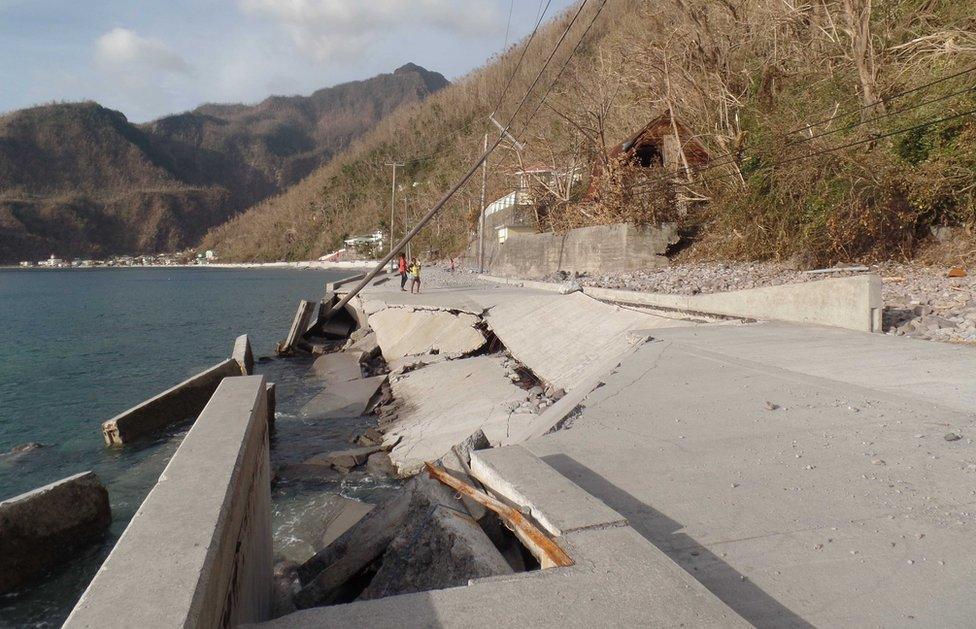
This wrecked road used to link Scott's Head to Soufriere, the next village
Grown men break down in tears as they point to the wreckage of their lives, a crude mass of debris where their home once stood.
Somewhere under the rubble of 75-year-old Ashton Thomas's coastal house is the body of his wife Lucy, 74, who slipped from his grasp as they tried to escape the surge of ocean water which hurtled inside.
"I have lived here for 27 years," he says, "I never thought a storm could do this. I was holding on to Lucy with one hand and the wall with the other. I managed to get her back once but she slipped away again. If I hadn't let go, she would still be alive. How do I explain this to my daughter?"
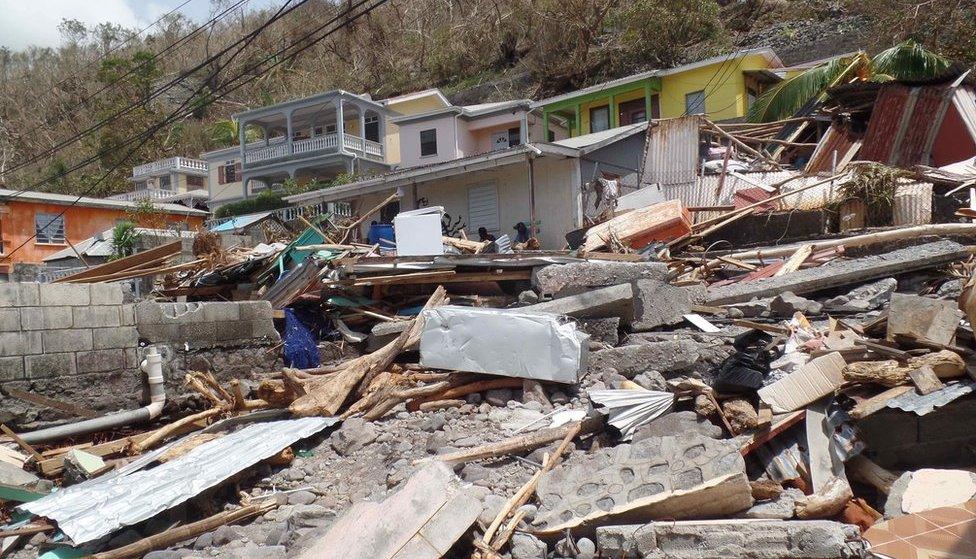
The body of Lucy Thomas, 74, is believed to be under this debris
In a school high up on the hill, accessed by picking one's way over a precarious mass of loose stones unleashed from the sea, elderly people sheltering here since the storm stare vacantly at the wall.
Dominica's famously lush mountainsides are today an irreverent brown, as if Maria sucked the colour and life out of the place too. Felled trees as thick as thatch line the beaches.
The loss of the coconut palms means there is no reprieve from the scorching sun. Scott's Head has intermittent mobile phone reception but no electricity or running water.
People's clothes are stiff from being washed in sea water, and hunger and thirst are omnipresent. The grim reality for those who have lost everything, including basic dignity, is now sinking in.
Among a group of women optimistically watching the horizon for incoming boats, two children play with salvaged dolls. "This is horrible," squeals a little boy in a pretend Barbie voice.
Marie Lewis says her four-year-old daughter now sticks her fingers in her ears every time it rains.
"I am still in shock," she imparts, gazing across at the ruined remains of the gas station and community centre. "I can't believe the village I have been in my whole life looks like this. It's unrecognisable."
In the next village of Soufriere, people say a relief helicopter dropped supplies the previous day but not enough for all of its 1,400 inhabitants.
"If you live on top of the hill, by the time you get to the bottom, all the food is gone," says mother-of-six Anne-Marie Williams.
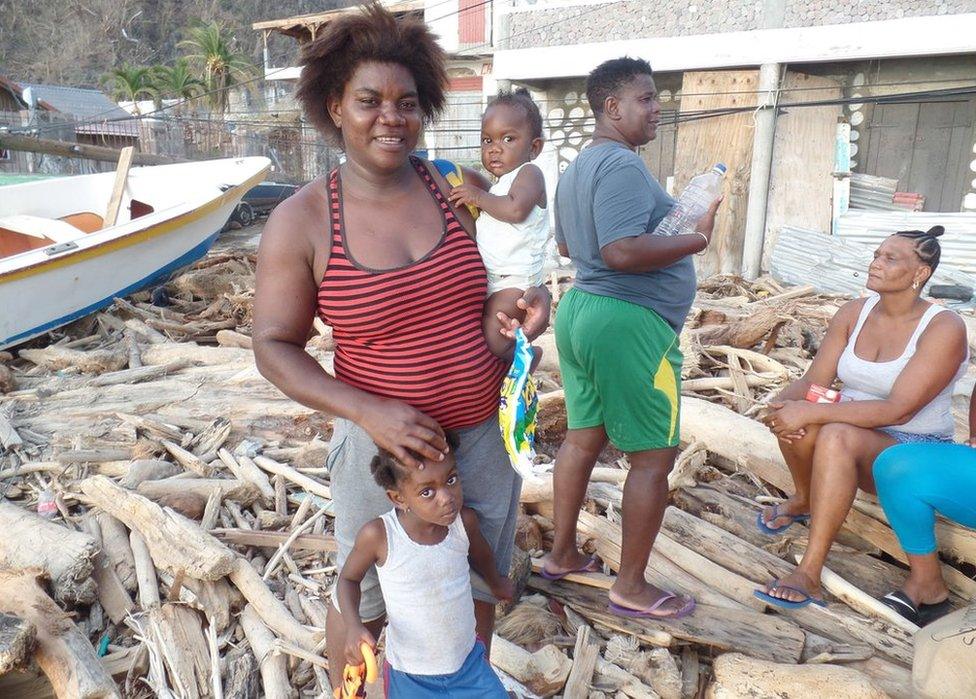
Anne-Marie Williams says her six children are going hungry
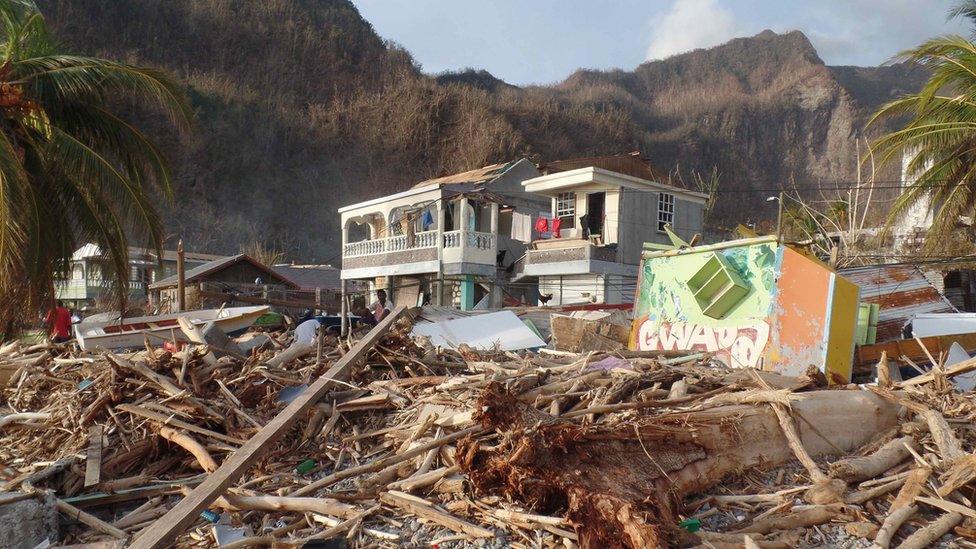
Soufriere, on Dominica's south-west coast, was a picturesque tourist village
Jani Baptiste says hungry villagers have been fighting over food supplies, an image magnified in the capital Roseau where scores of regional security personnel are now helping to keep the peace.
Others related tales of clambering through mud and rubble to reach Roseau for supplies, only to find all shops looted in a city where "water is gold".
Nonetheless, community spirit for the most part is thriving. Lawyer Noreen John spoke of cooking oatmeal for Scott's Head villagers, the first hot meal in days, on her neighbour's stove.
"We had never said more than hello to each other before," she says. "Now we are sharing everything, improvising with whatever we find. Someone with a car battery is charging phones for the whole village. Simple things have so much value now."
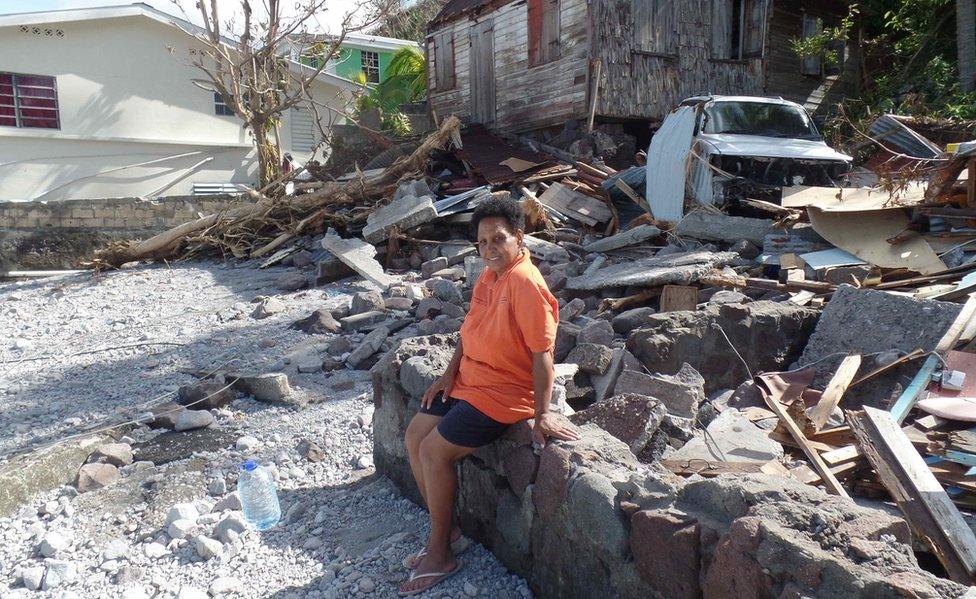
Lawyer Noreen John said community spirit is thriving among Scott's Head villagers
Nationwide, a 1600 to 0800 curfew remains in place and damage assessments are under way, Prime Minister Skerrit said on Monday. He spoke of the "humungous challenge" ahead but pledged that every village would soon be reached.
That cannot come soon enough for the villagers of Scott's Head, who for now are left to sit and watch the sea that swept away everything they had, hoping the next tide will bring the help they so desperately need.
- Published24 September 2017
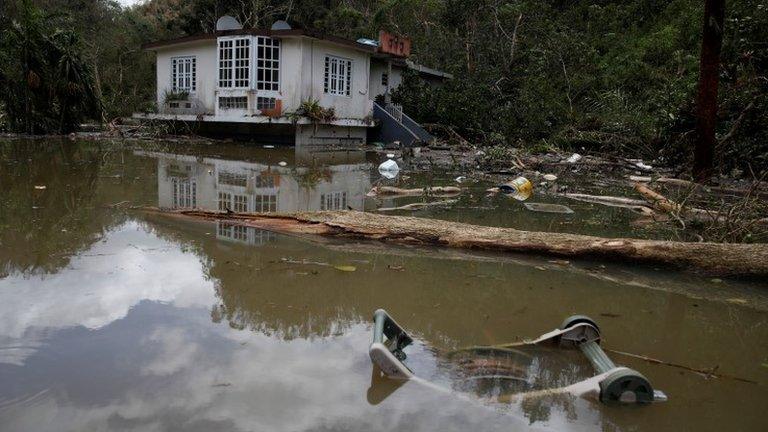
- Published21 September 2017
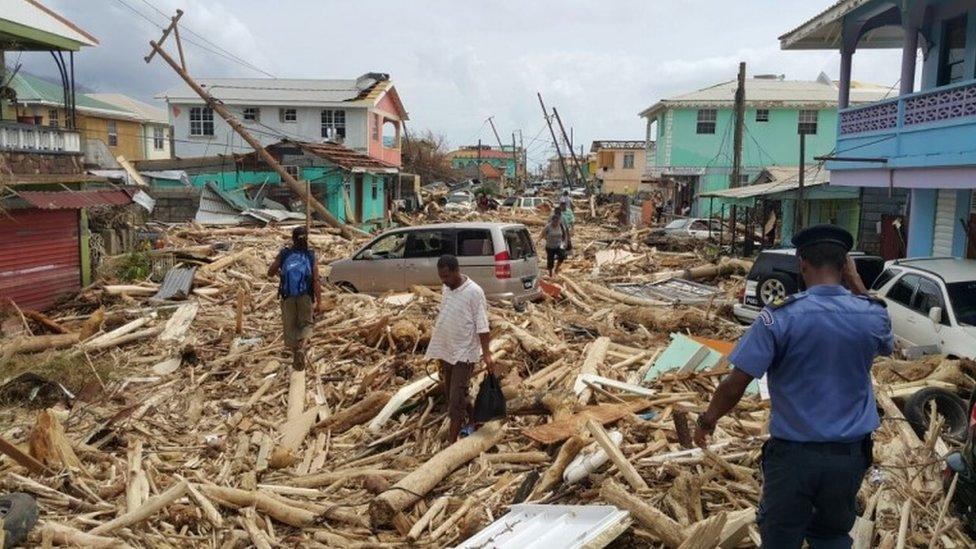
- Published2 April 2024
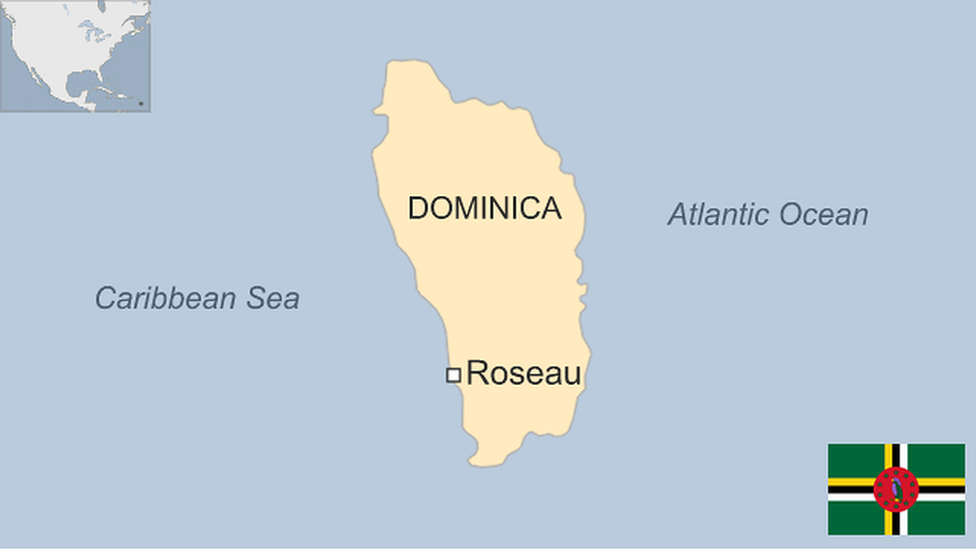
- Published19 September 2017
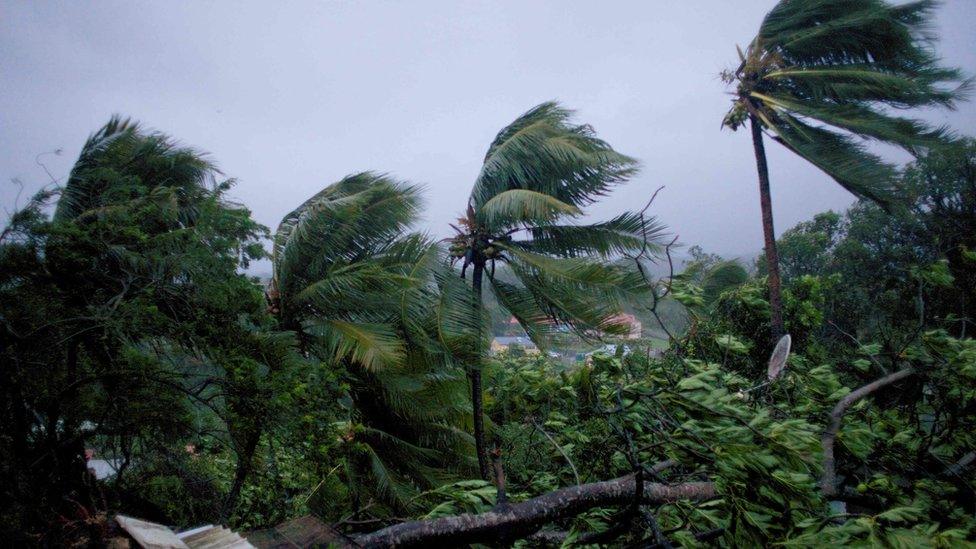
- Published19 September 2017
